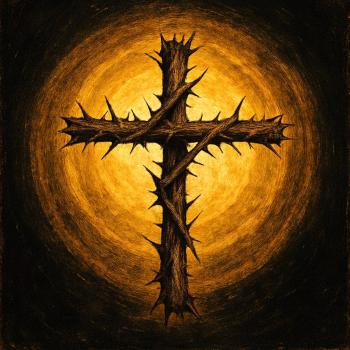Palm-Passion Sunday – April 13, 2025
Bruce G. Epperly
The Triumphant Entry
Luke 19:28-40
Psalm 118:1-2, 19-29
The Passion of Jesus
Isaiah 50:4-9a
Psalm 31:9-16
Philippians 2:5-11
Luke 23:1-49
Celebration or Passion
At the edge of Holy Week, the preacher must ponder whether to lean toward the violence and abandonment of Maundy Thursday and Good Friday or focus on the celebrative spirit of Palm Sunday or attempt a creative synthesis of both. Holy Week is an emotional and spiritual roller coaster with political implications. Or perhaps the preacher can do both, contrasting the way of Jesus with the way of Caesar, a theme that is as current as today’s headlines relating a president who patterns himself after the worst imperial rulers and seeks adulation and loyalty above goodness and compassion.
Whatever decision the homilist makes, the order of the day for Palm/Passion Sunday involves the interplay of celebration and passion. The celebrative parade masks underlying tension. Jesus’ entry is a prelude for conflict with the religious and political authorities. Passion Sunday focuses on life’s darkest hours, but the darkness reveals Jesus’ commitment to God’s realm and our salvation.
Palm/Passion Sunday is the appropriate theological as well as chronological entry point for the spiritual maelstrom on the horizon for us and for Jesus. The period between Palm Sunday and Easter encompasses the full spectrum of public and private life – adulation and abandonment, celebration and conflict, integrity and suffering. This was the experience of Jesus’ first followers and it is the experience of USAmericans who see our nation choosing death and destruction over life and creation.
In the week ahead, we encounter the ambiguity (or evil) of religious and secular institutions. As we witness on a daily basis, our institutions, intended for good, are often diabolical agents of destruction. As Walter Wink observed, the powers are good; the powers are fallen; the powers can be redeemed. But, we wonder as we see a leader hellbent on destruction, can they be redeemed? Will these dry bones live?
A Cruciform Ministry
The gospel readings present Jesus’ ministry as cruciform in nature. Jesus is lured by his commitment to God’s way toward Jerusalem and the cross. Some see this as predetermined. For example, a Christmas billboard I saw in Lancaster, Pennsylvania portrays a manger and cross side by side and proclaims, “born to die,” they believe Jesus’ whole life is aimed at redeeming us on Calvary. According to this perspective, Jesus, Pilate, the Jewish religious leaders, and the crowd are playing preordained roles in God’s plan of salvation, they assert. Such a view makes us puppets, minimizes the evil of institutional decision-making, and makes Jesus’ sacrifice a sham. In contrast, I see the cross as a reflection of the providence of grace and decision-making, not the providence of predestination. Jesus’ integrity, shaped by his faithfulness to God’s vision and his willingness to challenge the religious and political powers, made the cross a possibility. I believe Jesus could have chosen other routes, but his integrity led him to follow God’s vision by staying in Jerusalem rather than choosing the peaceable life of a married village rabbi, making a local difference but never of any consequence in the unfolding of human history.
Jesus followed God’s vision through the valley of conflict and persecution. Jesus’ first century faithfulness to God’s vision of Shalom, and not destruction, shapes our lives today.
After the celebration of the Jesus’ entry to Jerusalem, we turn to the abandonment and agony of Jesus’ passion. Isaiah portrays a faithful rabbi, who faces persecution and conflict with integrity and fidelity. The suffering servant of Isaiah stays the course regardless of the opposition he faces. His integrity is sustained as well as nurtured by his trust in God’s faithfulness.
Psalm 31 also highlights God’s faithfulness. Despite the conflicts of life, the Psalmist proclaims that our times our in God’s hands. God sustains us as we travel through the valley of the shadow of death and God will meet us on the other side.
The Love of Power or the Power of Love
Philippians 2:5-11 is, according to many scholars, one of the earliest Christological hymns. Whether initially from Paul’s hand or from another early Christian author, Paul’s use of passage implicitly contrasts Christ and Caesar, and two very different visions of power and success. Both are rulers, but one rules by coercion, while the other rules by love. Caesar is exalted above us; Christ is one of us. Bowing before Caesar is motivated by fear; bowing before Christ is motivated by love. Jesus’ power is relational and inspirational; Caesar’s power excludes, dominates, and depresses all but the chosen few. Surely, Paul’s Philippian readers would have known which path to follow to be faithful to the way of Jesus and God’s vision for their community.
In pondering Christian history, philosopher Alfred North Whitehead asserts: “When the Western world accepted Christianity, Caesar conquered…The brief Galilean vision of humility flickered throughout the ages, uncertainly. In the official formation of the religion, it has assumed the trivial form of the mere attribution to the Jews that they cherished a misconception about their Messiah. But the deeper idolatry, of the fashioning of God in the image of the Egyptian, Persian, and Roman imperial rulers was retained. The Church gave unto God the attributes which belonged exclusively to Caesar.”
And we are asked, will we choose Caesar or Jesus in our understanding of God and our nation’s politics.
There is an implicit theological and soteriological universalism in Philippians 2. Every knee bows from love – the key word is “every.” Could this mean that eventually everyone will experience God’s love first hand? Could this mean that despite our infidelity eventually we will experience grace, inspiring us to say “yes” to God’s love? Surely this is the implication of Philippians 2 and Jesus’ pronouncement on the cross, “Father, forgive them.” Jesus’ amazing forgiveness opens the door for every lost child, regardless of her or his past infidelities. Sin is real, but grace is greater. We can turn away from God’s vision and suffer the consequences of our decisions, but God will not turn away from us.
Like ourselves, the characters in Luke’s passion are flesh and blood decision-makers. They are agents in condemning Jesus, not characters in a previously written script. Jesus is also an agent: at every step of the way, making decisions, feeling the pain of abandonment, and experiencing the emotional, spiritual, and physical agony of torture.
To make sense to twenty-first century people, Palm/Passion Sunday must be seen as a contemporary event, revealed in the machinations of political and religious leaders. In this era in which some collapse religion and politics to advocate immoral treatment of immigrants and xenophobic public policies, the message of Holy Week takes a very different path. When many Christians choose Caesar over Jesus as lord of their political lives, we must examine our loyalties, and follow Jesus even when we make tough decisions in business, politics, and our professional lives.
The hymn, “Were you there when they crucified my Lord?” refers to our current situation. We are both faithful and fickle. We are committed yet turn our back on our ideals and God’s dream for humankind and the Earth, as individuals and as a nation. We feel courage, yet are overcome by fear. Still, there is hope in our ambivalence and weakness; God does not abandon us even when we abandon God. God persistently and providentially provides pathways toward wholeness, and like a holistic physician uses every means to bring us to wholeness, regardless of our past. We were there at the Cross and Palm Sunday; and we are here on Easter, living the resurrection and transformation God envisions for us. Through it all, we can proclaim with Psalm 118, “this is the day that God has made and we will rejoice and be glad in it.”
++++
Bruce Epperly is Theologian in Residence at Westmoreland Congregational United Church of Christ, Bethesda, MD (https://www.westmorelanducc.org/) and a professor in theology and spirituality at Wesley Theological Seminary. He is the author of over 80 books including: “Homegrown Mystics: Restoring the Soul of Our Nation through the Healing Wisdom of America’s Mystics” (Amazon.com: Homegrown Mystics: Restoring Our Nation with the Healing Wisdom of America’s Visionaries: 9781625249142: Epperly, Bruce: Books) “Jesus: Mystic, Healer, and Prophet “(Jesus: Mystic, Healer, and Prophet: Epperly, Bruce: 9781625248732: Amazon.com: Books), Saving Progressive Christianity to Save the Planet”( Saving Progressive Christianity to Save the Planet: Epperly, Bruce G: 9781631999215: Amazon.com: Books), and his most recent book, “God of the Growing Edge: Whitehead and Thurman on Theology, Spirituality and Social Change.” (The God of the Growing Edge: Whitehead and Thurman on Theology, Spirituality, and Social Change: Epperly, Bruce G: 9781631999291: Amazon.com: Books The God of the Growing Edge: Whitehead and Thurman on Theology, Spirituality, and Social Change: Epperly, Bruce G: 9781631999291: Amazon.com: Books)












